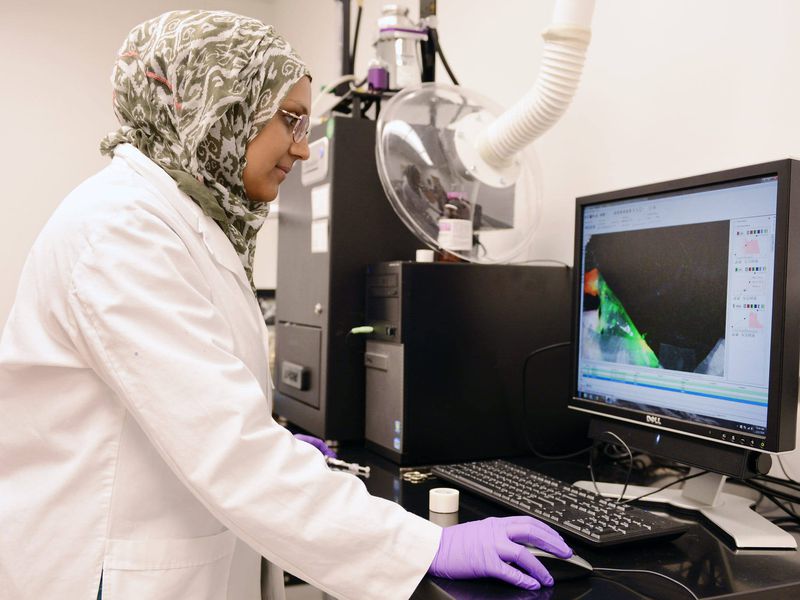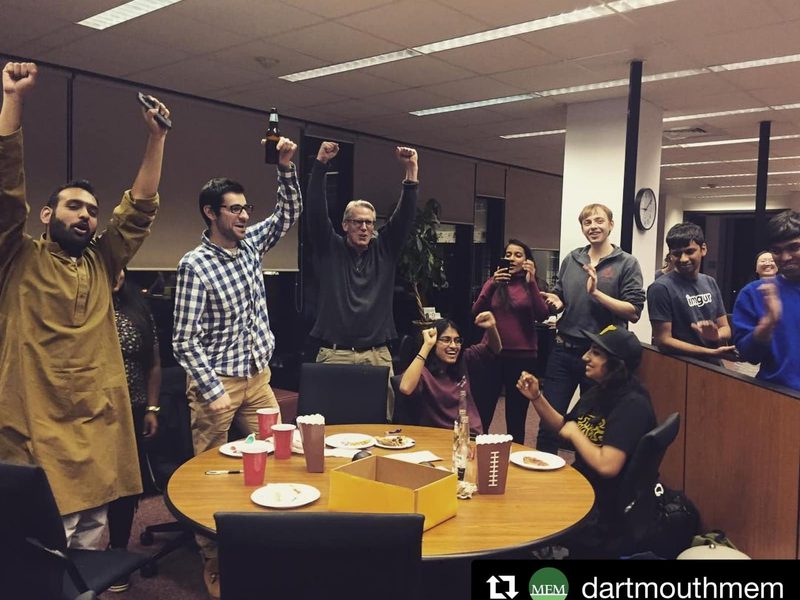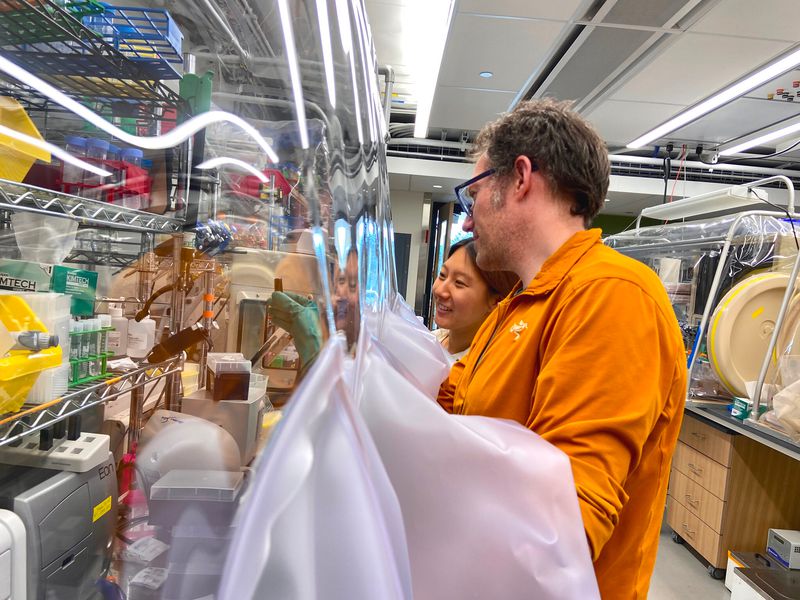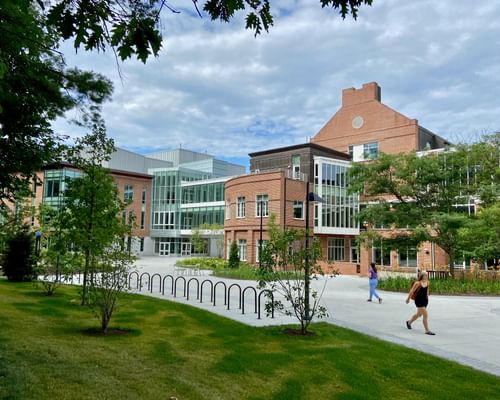On This Page
- Areas & Options
- Prerequisites
- Courses & Requirements
- Tuition, Expenses & Aid
- Join Our Next Info Session

Dartmouth offers a diversity of concentrations with collaborative synergies between engineering disciplines. Graduate students are expected to propose a plan of study that supports their interests on a path unconstrained by disciplinary boundaries. Both faculty and students draw from these multiple areas of expertise for maximum human-centered impact:

With advance planning and pending a willing Dartmouth faculty sponsor, Dartmouth undergraduate students interested in also pursuing the MS may be able to earn the degree within one year after finishing the requirements for the Bachelor of Engineering (BE). Students may use up to six applicable graduate courses for both their BE and MS programs. Those courses must be beyond the requirements for the AB (typically in the fifth year) and students must have taken a substantial portion of the undergraduate program at Dartmouth or in one of its official exchange programs. Students should discuss their plans to satisfy both program requirements with the MS program director. At least one term prior to their thesis defense, the BE/ MS candidate submits to the registrar a BE program plan approved by both their advisor and the BE program director.
For available projects that can satisfy BE+MS degree requirements, see the MS projects list.

Dartmouth's MS+MD program, offered by Thayer and The Geisel School of Medicine at Dartmouth, is designed for students intending to pursue clinical practice and want to develop research skills in a related engineering area. It is also well suited to students who want to better understand technologies they will employ as practicing physicians. The program provides a funded research experience in engineering that is expected to lead to a research publication and provides practice in engineering design and analysis.

Students who want to qualify in both research and the practical application of engineering and management may earn the MS and the Master of Engineering Management (MEM) degrees simultaneously by completing all the requirements of both degrees. A separate application to the MEM program is required; the student should work out course choices and funding plans for each degree. Interested students should contact the MEM Director.

Highly qualified students may be allowed to transition to a PhD degree program with the approval of the Senior Associate Dean for Research and Graduate Programs and at the invitation of a willing faculty sponsor.
MS candidates are required to hold a bachelor level degree in engineering or in one of the physical sciences from an accredited institution. Admitted students who require additional engineering coursework may be required to complete additional undergraduate engineering courses prior to beginning their MS studies.
All students entering the program are required to take six graduate-level courses, beyond the AB degree, reflecting a distribution across applied math (one course), engineering depth (three courses), and engineering breadth (two courses). Students with prior graduate credits may transfer up to a maximum of three graduate course credits to count towards their required MS coursework, provided they were not used to satisfy bachelor's degree requirements. Dartmouth Bachelor of Engineering (BE) students may count up to six applicable classes towards both the BE and Master of Science (MS) degrees.
Please note: The information below reflects degree requirements, effective as of fall 2025.
| COURSE TYPE | NUMBER OF REQUIRED COURSES | COURSES |
|---|---|---|
| Applied Mathematics | 1 course | Choose at least one course, from the following: ENGS 91: Numerical Methods in Computation |
| Engineering Depth | 3 courses | Choose at least three courses, from the following: Courses in the area of the student's research should be chosen to increase the student's depth of expertise and knowledge. These courses should be chosen in concert with the thesis advisor from the graduate engineering listings. Engineering Management courses are not permitted. |
| Engineering Breadth | 2 courses | Choose at least two courses, from the following: Students may choose from any graduate course listing area, with approval of the thesis advisor and the graduate program committee. |
Students are required to take ENGG 700: Responsible & Ethical Conduct of Research as part of the requirements for embarking on research for the MS program. The research must lead to a written thesis that demonstrates a depth of knowledge in a specific field of engineering research or design.
Candidates must also present a public oral defense of the thesis, which is conducted by the candidate's thesis committee. The MS thesis committee typically consists of three Dartmouth faculty members (including the student's thesis advisor); one of the three may be from outside the program of study.
Candidates are responsible for giving final, signature-ready copies of the thesis to each committee member to review at least two weeks prior to the defense. Candidates must submit an electronic notice of the defense to the registrar two weeks in advance for distribution to the faculty and for posting. A PDF copy of the thesis, including thesis committee members' signatures, must be submitted to the registrar for archiving. Additional information is available from the Thayer Registrar and the Thesis Guidelines (.pdf).
In the tradition of our founder Sylvanus Thayer, graduate students are encouraged to participate in service activities, such as those sponsored by the Tucker Foundation and Thayer Council.
All students, upon matriculation, are required to attend a series of workshops in ethics and sign a statement that they agree to abide by the honor principles established by Dartmouth. See Graduate Academic and Conduct Regulations for a full statement of academic honor.
Each MS student has a faculty advisor who aids the student in developing a full program plan to fulfill the MS requirements, which they will submit to the Thayer Registrar before the beginning of the second term to get approved by the Senior Associate Dean of Research and Graduate Programs
A student’s faculty advisor also supervises the student's research and typically serves as chair of their thesis committee. Therefore, applicants interested in pursuing the MS degree should contact Thayer faculty within their area of interest for an initial conversation about the program.
Most MS students are self-supported, similar to other master's students. Self-supported students are responsible for tuition, fees, and health insurance, and are eligible to apply for need-based financial aid.
In some cases, students may be funded through research grants and/ or faculty support. This funding typically covers tuition, a stipend, and health insurance. MS students may be funded during all their terms in the program, or only those following completion of their six required courses once they are engaged in full-time thesis research.
Review the cost of attendance breakdown of tuition and college-related expenses. Other than tuition and fees, college-related expenses are estimates.
Many students seek external financial support through scholarships, fellowships, and grant programs.
Current Dartmouth BE students applying to the MS program may be eligible for need-based "BE aid" for the terms that they need to take classes, after which they are covered by faculty research support.
A number of fellowships offering financial awards are available to graduate students. The lists accessible below are organized by application deadline to help you navigate these opportunities.

Learn how Dartmouth Engineering's graduate programs could be a great fit for you. Connect with faculty, staff, and students, and navigate the application process.